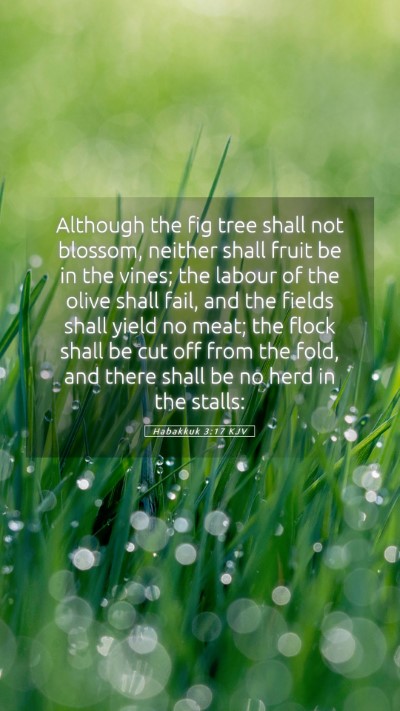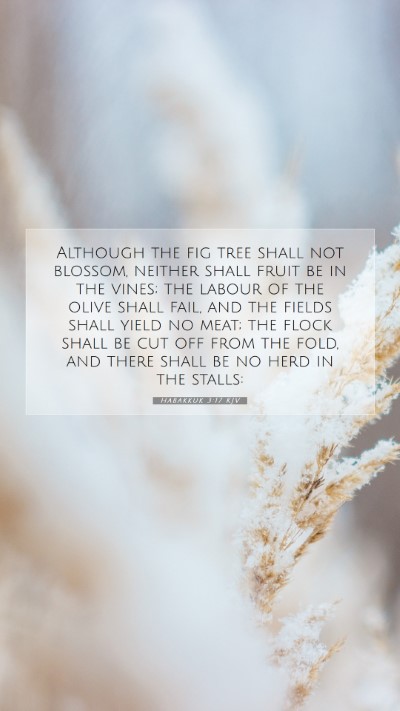Old Testament
Genesis Exodus Leviticus Numbers Deuteronomy Joshua Judges Ruth 1 Samuel 2 Samuel 1 Kings 2 Kings 1 Chronicles 2 Chronicles Ezra Nehemiah Esther Job Psalms Proverbs Ecclesiastes Song of Solomon Isaiah Jeremiah Lamentations Ezekiel Daniel Hosea Joel Amos Obadiah Jonah Micah Nahum Habakkuk Zephaniah Haggai Zechariah MalachiHabakkuk 3:17 Meaning
What is the meaning of Habakkuk 3:17?
Although the fig tree shall not blossom, neither shall fruit be in the vines; the labour of the olive shall fail, and the fields shall yield no meat; the flock shall be cut off from the fold, and there shall be no herd in the stalls:
Habakkuk 3:17 Bible Verse Meaning
Understanding Habakkuk 3:17
Habakkuk 3:17 states:
"Although the fig tree shall not blossom, neither shall fruit be in the vines; the labour of the olive shall fail, and the fields shall yield no meat; the flock shall be cut off from the fold, and there shall be no herd in the stalls:"
This verse speaks to a profound sense of desolation and unfruitfulness. In navigating the meanings of this Bible verse, we explore its implications and significance within the broader context of Scripture. Insights from public domain commentators provide a rich analysis aligned with the primary objectives of understanding Scripture through a biblical exegesis lens.
Bible Verse Interpretations
According to Matthew Henry, this verse reflects the reality of hard times and spiritual barrenness. When the fig tree does not blossom, it symbolizes unmet expectations. This serves as a call for believers to hold fast to their faith in adverse conditions, trusting in God's provision despite outward appearances.
Albert Barnes elaborates on the agricultural metaphors, emphasizing that the failure of crops indicates a complete scarcity. However, he also indicates that these experiences are opportunities for believers to deepen their reliance on God rather than on material goods. The absence of livestock and harvest accentuates the theme of reliance on divine sustenance amidst trials.
Adam Clarke interprets this verse as an expression of faith amidst despair. He highlights the idea that true faith does not depend on outward prosperity; instead, it flourishes in difficult circumstances. Believers are encouraged to focus on spiritual growth rather than material wealth during these times of lack.
Key Themes and Insights
- Despair and Faith: The imagery of barrenness represents moments in life where hope seems lost. Yet, the resolution is to maintain faith in God regardless of circumstances.
- God's Sovereignty: The verse reflects the belief that even in times of disappointment, God's rule and care persist. His sovereignty persists beyond current situations.
- Inner Strength: Habakkuk concludes with a personal declaration of faith, signaling that strength comes not from external circumstances but from a relationship with God.
Application of the Verse
When applied to daily life, Habakkuk 3:17 teaches about resilience and steadfastness in the face of disappointment. Believers can use this verse as a reminder of the importance of faith when circumstances are dire.
- In times of economic hardship, this verse encourages individuals to seek divine strength.
- In a spiritual context, it prompts reflection on reliance not just on material things, but on God's presence and promises.
- Community support in Bible study groups can be vital in encouraging one another through studies of verses like this.
Cross References
- 1 Peter 5:7: "Casting all your care upon him; for he careth for you."
- Philippians 4:19: "But my God shall supply all your need according to his riches in glory by Christ Jesus."
- Isaiah 41:10: "Fear thou not; for I am with thee: be not dismayed; for I am thy God: I will strengthen thee; yea, I will help thee; yea, I will uphold thee with the right hand of my righteousness."
Conclusion
In summary, Habakkuk 3:17 is not just a lament but a profound declaration of faith in God as the ultimate provider. For those seeking deeper insights, Bible study resources can be invaluable to understand the significance of Scripture. This verse encapsulates the journey through trials and the unwavering hope in divine sustenance.


